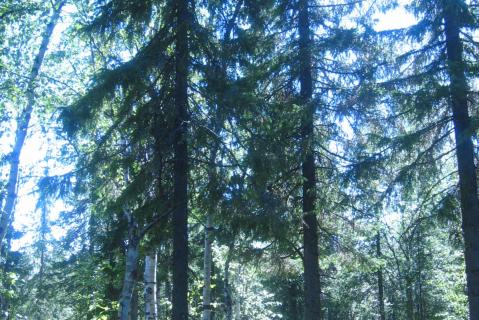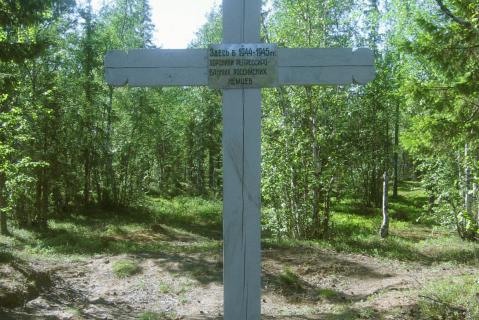In the 1940s the Novy Bor state farm was a special outpost of Vorkutlag. Deported Soviet Germans, mainly labourers invalided out of the Vorkuta coal mines, were transferred there from June 1944. Before 1946 they were held as prisoners. A section of wooded land to the west of the settlement was allotted to them as a burial ground. In 1944-1945 they were not permitted to bury those who died, and all burials were anonymous, the graves bearing no name markers. The numbers buried in the special cemetery have not been established and there are no lists of names. Later they were allowed to bury their dead in the settlement graveyard.
A memorial cross at the former camp burial ground was erected on 28 August 1999, thanks to the efforts of A.T. Kurengin, the director and founder of the farm’s Museum of Labour and Military Glory. The text reads: “Repressed Russian Germans were buried here in 1944-1945”.
The Memorial online database (2025) lists 129,473 victims in the Komi Republic. (See Nizhny Chov.)
Among them were over 64,000 deportees sent to or born in the Republic. During collectivisation (1929-35) they numbered 20,366, a quarter of whom were aged 1-10. In 1940 there was a massive influx from occupied Polish territory (19,367). More, mainly Germans (5,970) were sent in the 1940s and 1950s (6,699).
The database lists 384 Germans mobilised in 1943 to serve in the Komi Republic and sent to Novy Bor.
| Date | Nature of ceremonies | Organiser or responsible person | Participants | Frequency |
|---|---|---|---|---|
|
nk
|
Civil rites and Commemorative Services
|
nk
|
nk
|
From time to time
|
| State of burials | Area | Boundaries |
|---|---|---|
|
Subsidence over burials
|
not determined
|
not delineated
|
[ Original texts & hyperlinks ]
Archive of the Novy Bor State Farm’s “Museum of Labour and Military Glory”
Reply from the Komi Republic Ministry of Culture (No 06-17-1230 of 30 April 2014) to a formal enquiry by RIC Memorial (St Petersburg)


